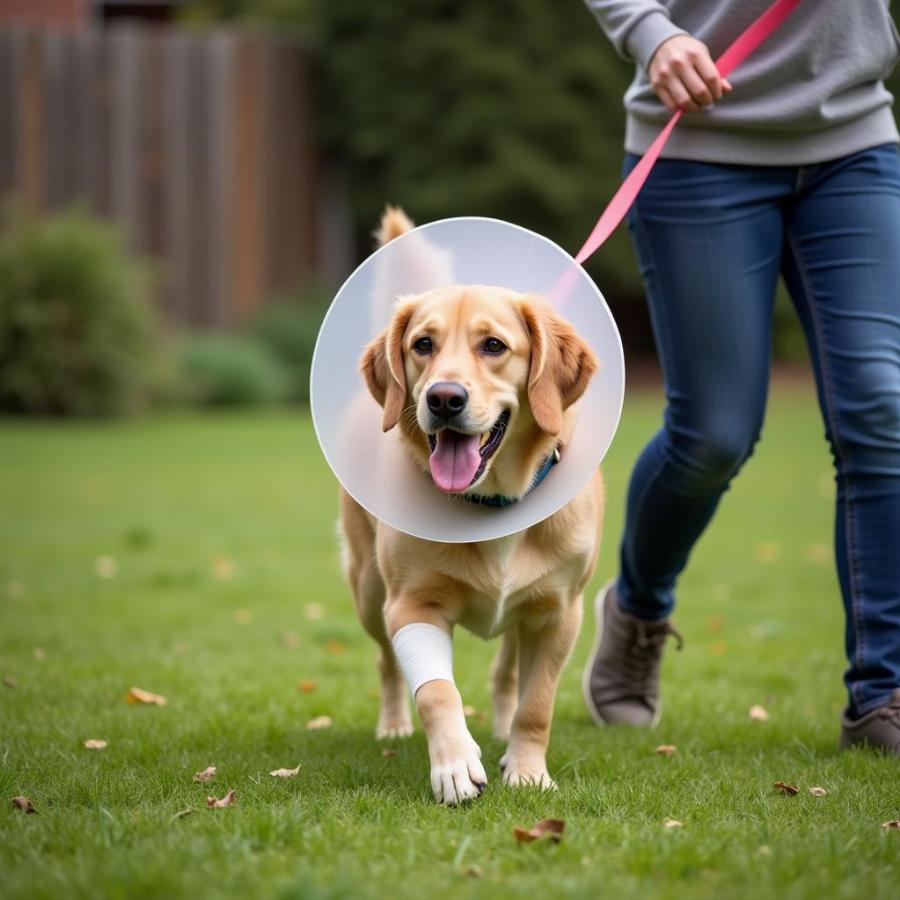If your furry friend recently underwent surgery and you find yourself anxiously Googling “dog not peeing after surgery,” you’re not alone. It’s a common concern among pet parents, and understanding the reasons behind it and what steps to take can make a world of difference in your dog’s recovery.
While it’s normal for dogs to take a little time to get back to their usual bathroom routine after surgery, prolonged inability to urinate can signal a problem. This article will guide you through the potential causes of post-surgery urinary retention in dogs, when to be concerned, and what you can do to help your canine companion.
Why Won’t My Dog Pee After Surgery?
There are several reasons why your dog might have difficulty peeing after surgery. Some of the most common causes include:
1. Anesthesia Effects
Anesthesia slows down bodily functions, including bladder function. This means your dog’s bladder might be full, but they lack the muscle control to urinate comfortably.
2. Pain and Discomfort
Pain medications, while crucial for recovery, can also temporarily decrease your dog’s urge to urinate. Additionally, pain from the surgery itself can make them hesitant to move into the necessary position to pee.
3. Stress and Anxiety
Being in an unfamiliar environment like a veterinary clinic, undergoing surgery, and the recovery process itself can be stressful for dogs. This anxiety can lead to them holding their bladder, even when it’s full.
4. Underlying Medical Conditions
In some cases, difficulty urinating after surgery might point to an underlying medical condition like a urinary tract infection (UTI), bladder stones, or other urinary tract issues that need veterinary attention.
When Should I Be Concerned?
While some delay in urination is expected, it’s crucial to contact your veterinarian immediately if:
- Your dog hasn’t urinated within 8-12 hours after surgery.
- They’re showing signs of discomfort or straining while trying to pee.
- You notice blood in their urine.
- They’re excessively licking their genital area.
- They seem lethargic, have a decreased appetite, or are vomiting.
These signs could indicate a urinary blockage or other complications that require immediate veterinary care.
How Can I Help My Dog Pee After Surgery?
Here are some tips to encourage your dog to urinate after surgery:
1. Provide a Comfortable and Familiar Environment
Create a quiet, safe space for your dog to recover. Use their favorite bedding and familiar toys to minimize stress and make them feel secure.
2. Encourage Water Intake
Offer fresh water regularly to keep your dog hydrated. Adequate water intake helps flush out the bladder and can make urination easier.
3. Gentle Walks and Exercise
Once cleared by your veterinarian, take your dog for short, gentle walks on a leash. Walking can stimulate bladder muscles and encourage urination.
 Dog walking on a leash after surgery
Dog walking on a leash after surgery
4. Bladder Expression
If your veterinarian approves, you can learn how to help your dog empty their bladder through a process called bladder expression. This technique involves gently applying pressure to the bladder to help release urine.
“It’s crucial to consult with your veterinarian before attempting bladder expression,” advises Dr. Emily Carter, a certified veterinary technician with over 10 years of experience. “Improper technique can cause injury or discomfort to your dog.”
5. Medication Adjustment
If pain medication is suspected to be hindering your dog’s urination, your veterinarian might adjust the dosage or prescribe a different medication.
What If My Dog Still Can’t Pee?
If your dog is still unable to urinate despite trying these methods, it’s essential to contact your veterinarian promptly. They might recommend further diagnostics like urine analysis, X-rays, or ultrasound to determine the underlying cause and provide appropriate treatment.
Conclusion
Seeing your dog struggle to pee after surgery can be worrisome, but understanding the common causes and taking appropriate steps can significantly aid their recovery. By closely monitoring their behavior, providing a comfortable environment, and working closely with your veterinarian, you can help your furry friend get back to their happy and healthy self.
Remember, if you’re ever in doubt, don’t hesitate to reach out to your veterinarian. They are your best resource for ensuring your dog’s well-being throughout their recovery process.
FAQs About Dogs Not Peeing After Surgery
1. Is it normal for my dog to not pee immediately after surgery?
Yes, it’s normal for dogs to experience a slight delay in urination after surgery due to anesthesia and stress. However, if they haven’t urinated within 8-12 hours, contact your vet.
2. How can I tell if my dog is uncomfortable trying to urinate?
Signs of discomfort include straining, whining, squatting repeatedly without urinating, and licking their genital area excessively.
3. Can I give my dog human medication for pain relief?
Never give your dog human medication without consulting your veterinarian. Many human medications are toxic to dogs and can have serious consequences.
4. How long will it take for my dog’s urination to return to normal?
The recovery time varies depending on the type of surgery and individual dog. Most dogs resume normal urination within 24-48 hours, but it can take longer in some cases.
5. When should I call my veterinarian?
Contact your veterinarian immediately if your dog hasn’t urinated within 8-12 hours after surgery, shows signs of discomfort while trying to pee, has blood in their urine, or displays any other concerning symptoms.
Looking for More Helpful Tips?
Check out these related articles:
Beaut Dogs is your one-stop resource for all things dog-related! We provide reliable, helpful, and in-depth information on the world of canines. When you need support, please contact us by Email: [email protected] to get detailed and accurate answers from Beaut Dogs.